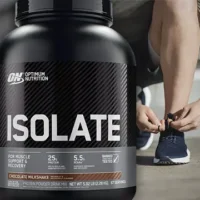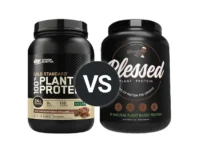Knowledge BaseYou're Questions Answered
Is protein powder necessary after a workout?
Protein plays a crucial role in post-workout recovery by repairing and rebuilding muscle tissue that has been broken down during exercise. While protein powder is a convenient and effective way to meet your post-workout protein needs, it is not strictly necessary as long as you consume enough high-quality protein through whole foods within a suitable time frame. Whether protein powder is necessary depends on your overall diet, fitness goals, and lifestyle.
Why Protein Is Important After a Workout
During resistance or endurance training, muscle fibers experience microscopic damage. Consuming protein after exercise provides the amino acids needed to repair and rebuild these fibers, leading to muscle recovery and growth. This process, known as muscle protein synthesis (MPS), is enhanced when protein is consumed soon after working out—ideally within 30 to 60 minutes1.
Benefits of Using Protein Powder Post-Workout
- Convenience: Protein powder is quick to prepare and easy to digest, making it ideal for busy individuals or those who prefer not to eat a full meal immediately after exercise.
- Controlled Dosage: Most protein powders provide a measured amount of protein (typically 20–30 grams per scoop), which aligns with the optimal dose shown to stimulate MPS after a workout2.
- Fast Absorption: Whey protein in particular is rapidly absorbed, helping to kick-start the recovery process sooner than some whole food sources.
Whole Food Alternatives
While protein powder is convenient, it is not the only way to meet your post-workout protein needs. Whole foods such as lean meats, eggs, dairy, legumes, tofu, and quinoa can also provide sufficient protein. The key is ensuring that your post-workout meal contains a complete protein source and meets your total daily protein requirements.
When Protein Powder May Be More Necessary
- Limited Time or Appetite: If you're not hungry after a workout or are short on time, a shake may be more feasible than a full meal.
- On-the-Go Lifestyle: Those who travel or work out between appointments may find protein powder a more practical option than meal prep.
- High Protein Needs: Athletes or those in muscle-building phases may find it difficult to meet their daily protein goals through food alone.
So, while protein powder is not strictly necessary after a workout, it is a convenient and effective way to support muscle recovery, especially when whole food options are not practical. If you meet your daily protein requirements through a balanced diet and consume a quality source of protein within a few hours of training, you may not need a supplement. However, for many people, protein powder remains a useful tool for reaching fitness and nutrition goals.
- Tipton, K. D., & Wolfe, R. R. (2001). Exercise, protein metabolism, and muscle growth. International Journal of Sport Nutrition and Exercise Metabolism, 11(1), 109–132.
- Moore, D. R., Robinson, M. J., Fry, J. L., Tang, J. E., Glover, E. I., Wilkinson, S. B., ... & Phillips, S. M. (2009). Ingested protein dose response of muscle and albumin protein synthesis after resistance exercise in young men. American Journal of Clinical Nutrition, 89(1), 161–168.
Related Questions

Your Answer
We are a participant in the Amazon Services LLC Associates Program, an affiliate advertising program designed to provide a means for us to earn fees by linking to Amazon.com and affiliated sites.





